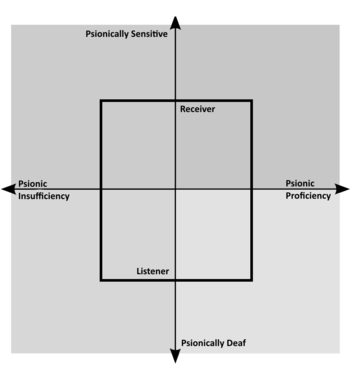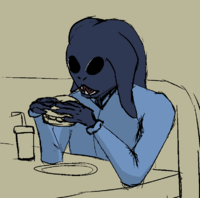Skrell Ethnicities
| Skrell Lore Pages | ||
|---|---|---|
| Skrell | Skrell Ethnicities · Skrell Relationships · Skrell Ailments · Notable Skrell | |
| Planets, Systems, Settlements | Qerrbalak · Qerr'Malic · Aliose · Aweiji · Tattuqig · Xrim · Diulszi · Skrell Abroad · Notable Skrell Systems and Locations | |
| Organizations, Factions, Politics | Nralakk Federation · Skrell Politics and Enforcement · Federation Crime and Resistance · C'thur in the Federation · Dionae in the Federation · Generation Fleets | |
| Culture, Society, History | Skrell Culture · Skrell Cinema and Idols · Skrell Education · Skrell Cuisine · Skrell History · Skrell Beliefs · Skrell Refugees · Skrell Mythology | |
Skrell Ethnicities
Since diverging from a shared ancestor known as the "Proto-Skrell" approximately ten million years ago, the Skrell are divided mainly into three ethnic groups: Axiori (Aquatics), Xiialt (Coastals), and Xiiori (Hybrids). The variations between the two are due to adaptations to better fit their environment, while interbreeding maintained genetic diversity in both groups.
Axiori
Axiori can be approximately translated to “aquatics” or “ocean-dwellers”, are were notably better adapted to survive with the depths of the Homeworld’s seas. Typically sporting much more pronounced webbings for faster swimming, as well as larger and more monocular eyes to better perceive their environment. The high-pressured environments in which they thrived and evolved have also resulted in a lower metabolic rate for the ethnicity, resulting in easier fat accrual.
Axiori, on average, tend to have far more raw psionic potential when compared to the Xiialt. Many studies that have dived into the topic in an attempt to answer why this occurs, suggest that is due to increased psionic usage and repeated interbreeding further strengthened these natural capabilities. Axiori also tend to have much darker skin tones, a trait believed to have helped them camouflage within the dark, deep depths of the Homeworld’s oceans many millennia ago.
Xiialt
Xiialt can be approximately translated to “coastals” or “land-dwellers”. These Skrell are the biological cousins of the Axiori. They tend to be somewhat short, but the stout nature of the Xiialt helped them traverse the rough nature of their biome with bipedal movement. Due to this, their feet are somewhat bigger than those of an Axiori and their leg muscles are more defined. It is theorized that this helped early Xiialt outrun predators on land. Xiialt also tend to be much leaner; this is due to their slightly higher metabolic rate due to the abundant presence of food on the surface. While Xiialt are better adapted to live on land they are still able to breathe and see underwater; however, their swimming is not as agile.
Xiialt, on average, tend to have far less raw psionic potential when compared to the Axiori. It is theorized that the early population boom played a role in this. For instance, Xiialt societies were dense and well populated. This helped to ward off predators but it also staved natural selection and resulted in the ethnicity’s lower psionic potential. Continued interbreeding within the ethnicity resulted in lowered psionic potential and has lead to stark differences between the subspecies.
Xiiori
Xiiori can be approximately translated to “hybrids”. These Skrell are the off-spring of a Xiialt and an Axiori (and in some cases a Xiiori and a Xiialt/Axiori). Xiiori genes typically tend to to lean more towards their Axiori ancestry. This is due to most Axiori genes being dominant; therefore, Xiiori have more psionic potential than Xiialt but less than pure-blooded Axioris. Typically, a Xiiori will look like a 60/40 split when it comes to their Axiori and Xiialt parents. There is little to no discrimination towards Xiiori from either Axiori or Xiialt; however, Xiiori are at a greater risk for many of the disorders that plague Skrell (often having at least one).
Hybridization
While most Skrell originally mated within their own ethnicities, as society evolved it became increasingly common to interbreed. This resulted in the designation of a new group known as the Xiiori (Hybrid), a combination of its parent ethnicities. Due to the genophage, however, a growing portion of newborn Skrell are Xiiori, which has all but ensured the slow decline of the other ethnicities as their DNA becomes more blurred in the face of the genophage crisis.
Psionic Differences
While both have a similar range of intellectual ability, the Axiori tend to have a higher number of psionic prodigies than their counterparts. It is theorised that this occurs due to genes passed down from the Proto-Skrell, which are significantly more common in the Axiori (recorded to have interbred with the Proto-Skrell until their eventual extinction) than the Xiialt. The discovery, pioneered by Psionic Analysis professor Yleshir Zrose, was titled the Zrose Graph. They conducted numerous inquiries into the psionic inclinations of both ethnicities during the modernisation of Skrell culture in the early 2300s BCE.
The Zrose Graph is typically used as a visual representation of a Skrell's psionic ability - usually displayed after a Skrell has undergone a Psionic Capability Test where Skrell are tested on their psionic receptiveness by highly trained Skrell known as Nlom'Qalq, roughly translated into Tau Ceti Basic as Wake Examiner. High-scoring individuals are pursued, oftentimes rather doggedly, by Federation officials and pressured into taking opportunities relating to either the Starkeepers or Sromkala. Those who refuse and fail to find an alternate path fast enough may soon find other doors to be closed to them—and the Federation is more than happy to extend a hand to such individuals, placing them in a role where their talent would not go unappreciated.
Disorders
Volvuunt Qixqalau
Volvuunt Qixqalau, essentially translating to "inverted gills". Skrell gills are commonly internal and protected by mucous membranes; those with the disorder have their gills inverted, resulting in their exposure to the air, whilst they limply hand below their jawline. This disorder is congenital, and cannot be developed over time. Many of those affected by Volvuunt Qixqalau suffer relatively little with the disorder, with external gills even being more effective underwater; however, due to the very delicate nature of the gills, they are prone to injury and infection, and can make it difficult to wear certain articles of clothing. Some afflicted with the disorder are so aggrieved that they prefer to get the disorder corrected via surgery (a lengthy and risky procedure due to the rarity of the disorder and delicate nature of the area), but technological advances and skilled surgeons over the millennia have made surgical correction a much safer procedure than it was previously. Others choose to use an adaptive apparatus, a water-filled collar that keeps their gills both hydrated and safe. Research as to how the mutation occurs has been mostly inconclusive, but it is proven that it is only inherited, with de novo mutations extremely unlikely.
Xibus
Xibus - loosely translated to beakmouth - is a genetic disorder and birth defect that is somewhat uncommonly found in Skrell. Manifesting at birth; it is the formation of interlocking chitinous plates in the mouth, similar to a squid's beak. These plates are sharp enough to cut, and those afflicted with untreated Xibus often find themselves accidentally biting and wounding the insides of their mouths. The plates are solid pieces which interlock, unlike human teeth which are separate structures. Xibus causes a strong speech impediment in those afflicted with it, leading the articulation of all sounds to have a "mouthful" quality, resulting in those affected to be hard to understand; with communication in Tau Ceti Basic being nigh impossible. Those with Xibus tend to prefer psionic communication, usually prompting outsiders to believe it is a relatively rare condition; on the contrary it is somewhat prevalent in the Axiori ethnicity, however, most sufferers of this genetic condition have it corrected in infancy, or else rarely leave their home system. The treatment for Xibus is simply the surgical removal of these chitinous plates; safely removed from the jaw without permanent debilitation, the procedure, typically done in infancy, grow to bear little evidence of the affliction. When performed in adulthood, this procedure is much more invasive with risks of complication, and so those without it corrected tend to refrain from surgical intervention later in life. It is also possible for Xibus to be grounded to manageable levels.









